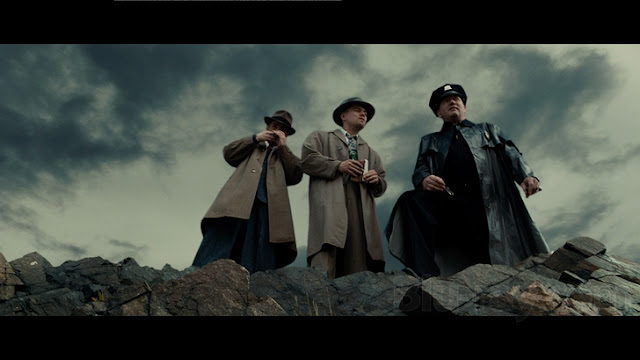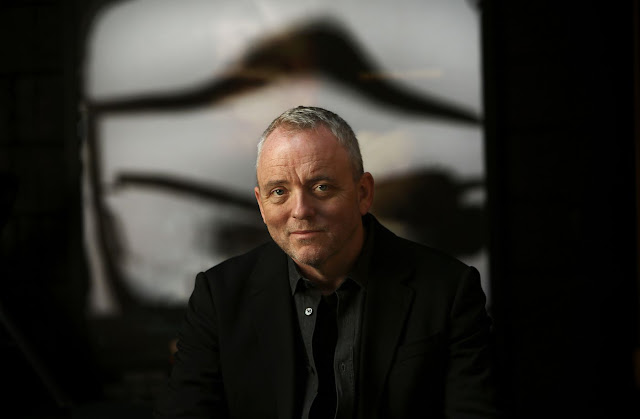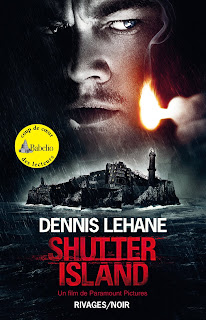Shutter
Island
is so deviously, darkly ingenious it's haunted me ever since I first
read it a dozen years ago. The film by Martin Scorsese, starring
Leonardo DeCaprio, was pretty spooky, too. But it's the book, not the
movie, that haunts me, and maybe that's because it was the book that
stole my innocence with its deviously ingenious plot, scaring me
damned near into a coma. The plot of Shutter
Island
is so ingeniously devious it fascinated and horrified me when I read
it again, last week. It has one of those endings you like to think of
as an aberration, that somehow you missed something important the
first time around and you’ll see it now and thank goodness it will
end the way your heart would like it to.
It didn’t.
It wasn’t as startling as the first time, but it crawled just as
deeply into my psyche and left me almost as shaken and bereft. Maybe
were I to read it once a week eventually it would injure me no more,
but then I’d likely end up as a mental patient myself. I’d be
better off putting a sticker on my library card that says
in
red letters,
“Please don’t let me check out Shutter
Island
ever
again!”
The story seems simple enough.
Two U.S. marshals arrive at Ashecliffe Hospital, a federal
institution for the criminally insane secluded on Shutter Island, one
of a string of islands off the coast of Boston. Their assignment is
to help authorities there find an escaped patient. We’ve already
learned on the ferry bringing them to the island that the approach of
a “huge” storm is apt to complicate their mission. It does, of
course, but so does an incremental accumulation of odd occurrences
the marshals encounter in this ancient fortress-like hospital that
had served as a Civil War POW camp. We come to realize the story’s
not nearly so simple as at first we thought.
 |
| From the film |
There are only sixty-six
patients, who, the marshals are told, are the most dangerous in the
entire prison system—essentially five-and-a-half dozen Hannibal
Lecters--which the marshals understandably keep calling “prisoners”
and are continually corrected by the medical staff. And the medical
staff? Umm...yes. Dr. Cawley, the head shrink, lives in residence so
massive and expensive the Union Army commandant who’d had it built,
was relieved of his command when he submitted the construction bill.
The head shrink’s chief assistant comes on like a Nazi who missed
the boat to Argentina with Dr. Mengele. Here’s how he greets the
marshals in the “Great Room” of the head shrink’s house:
The stranger looked up at
them. “You don’t indulge in alcohol?”
Teddy looked down at the guy.
A small red head perched like a cherry on top of a chunky body. There
was something pervasively delicate about him, a sense Teddy got that
he spent far too much time in the bathroom every morning pampering
himself with talcs and scented oils.
“And you are?” Teddy said.
“My colleague,” Cawley
said. “Dr. Jeremiah Naehring.”
The man blinked in
acknowledgment but didn’t offer his hand, so neither did Teddy or
Chuck.
“I’m curious,” Naehring
said as Teddy and Chuck took the two seats that curved away from
Naehring’s left side.
“That’s swell,” Teddy
said.
“Why you don’t drink
alcohol. Isn’t it common for men in your profession to imbibe?”
Cawley handed him his drink
and Teddy stood and crossed to the bookshelves to the right of the
hearth. “Common enough,” he said. “And yours?”
“Excuse me?”
“Your profession,” Teddy
said. “I’ve always heard it’s overrun with boozers.”
“Not that I’ve noticed.”
“Haven’t looked too hard,
then, huh?”
“I’m not sure I follow.”
“That’s, what, cold tea in
your glass?”
Teddy turned from the books,
watched Naehring glance at his glass, a silkworm of a smile twitching
his soft mouth. “Excellent, Marshal. You possess outstanding
defense mechanisms. I assume you’re quite adept at interrogation.”
Heh heh, ve haff our vays…
And then there’s young
doctor Sheehan, who suspiciously left the island when the marshals
arrived, leading the marshals to speculate whether Sheehan ran off
with the beautiful prisoner/patient after helping her escape from her
locked cell despite a gauntlet of guards she’d have to have gotten
past. Sheehan’s supposedly taken a long-awaited vacation, but,
alas, the phones and radios are down, presumably because of the
pending storm, and cannot be reached.
We learn the marshals have
their own private agenda for visiting Ashecliffe, to gather evidence
for a U.S. Senator of illegal experiments reputedly being conducted
on the prisoners...er, patients of the sort Nazis conducted on Jews
during WWII.
 |
| Dennis Lehane |
Another doctor, hiding in a
cave on the island, claiming to be the alleged escaped patient,
describes to one of the marshals the experiments being conducted in
the island’s heavily guarded lighthouse, which is supposedly being
used as a sewage treatment facility. The experiments are intended to
create a man that “doesn’t need sleep, doesn’t feel pain,”
she tells him. “Or love. Or sympathy. A man who can’t be
interrogated because his memory banks are wiped clean...they’re
creating ghosts here, Marshal. Ghosts to go out into the world and do
ghostly work.”
One of the marshals vanishes
after the hurricane hits Shutter Island with 150 m.p.h. winds. The
surviving marshal, Teddy Daniels, figures his partner’s been
murdered and that he, Daniels, is next. His access to the ferry, the
only way off the island, is blocked. Determined now to find out
what’s going on in the lighthouse, he overpowers a guard, grabs his
rifle, and storms into the tower and up the spiraling stairs. I...I
can’t go on. I simply can’t tell you what happens next.
I...can’t. My fingers have weakened, hands trembling, my
heart...oh, mercy!
[For
more Friday's Forgotten Books check the links on Patti
Abbott's unforgettable blog]

I hate the book. It went airborne in disgust by that cop out ending.
ReplyDeleteOh, well...
DeleteThis is one of my favorite books of all time (not as big a fan of the movie, though DiCaprio did his best). Lehane is, as always, brilliant, and yes, I had to reread that one "ambiguous" sentence a dozen times when I finished reading. Clever and fair. You cannot ask for more than that from a mystery/suspense novel. I have often recommended it to friends and other writers as an example of what to do to be great. Thank you for this post.
ReplyDeleteThanks for your insightful comment, Judy. I tend to identify rather closely with strong characters in novels, and, well...this one rather discombobulated me!
DeleteAm I the only one who saw through the plot gimmickry in SHUTTER ISLAND? I thought it was utterly derivative, extremely familiar and the "twist" transparent. Reminded me of dozens of horror movies set in asylums I've seen and books and stories I've read. It's so atypical of Lehane. It felt like he was slumming. I've always felt that it was a screenplay first and then he later turned it into a novel. MYSTIC RIVER is his masterpiece, I think. A genuine modern tragedy. But SHUTTER ISLAND is a 1950s B movie on paper in comparison.
ReplyDeleteI suspect you read more critically than I, John. I can't help but suspend disbelief if the writing is clever and the characters strongly drawn. Too, I suspect you're far better read than I am. I swallowed the plot hook, line, and sinker--otherwise I wouldn't have finished the book.
DeleteJ F, no, you are not the only one. Hooked by the beginning, caught on my the middle, bored by the end. And you are also correct about MYSTIC RIVER.
DeleteTo emphasize, I don't read for profundity, I read for fun. Shutter Island was, to my unsophisticated sensibility, a fun read. That it shocked the shit out of me at the end might reveal my gullibility, but it sure as hell didn't bore me. To me, nothing's more boring than the bored.
DeleteAGREED. Can't help but think of "Let's eat, Grandma" "Let's eat Grandma" when thinking of that book. I love Lehane, so I am biased, but I could not put that book down. To me, that's a winner.
ReplyDeleteTo me, reading a book twice is a grand slam, Judy.
DeleteI was hooked on the book until the cop out ending. But, Mystic River, on the other hand is the winner.
ReplyDeleteI'm curious, Kevin, why do you say "cop out"? How might you have ended the story?
DeleteTo me it was like doing a shower scene or that everything was a dream. As a reader, I felt ripped off big time. As a writer.....I have no idea now. I used to have an answer for this question when asked by fans of the book, but too much has happened these past years and now I don't remember my brilliant answer to this question.
DeleteIt was a dream, a schizophrenic dream. My former sister-in-law is schizophrenic. Much of her life is a nightmare to her. Shutter Island is about an extreme case of schizophrenia. The only part that pushed the envelope for me was Ashecliffe entire cast participating in Teddy's dream in the hope of shocking him back to reality, without electrodes. Sure it's far-fetched, maybe even implausible on such a large scale. But it's fiction. It asks us to suspend our disbelief long enuf to consider the circumstances. In my opinion only a writer of Lehane's skill could bring it off. John says it's an old idea. I don't know, but even if it is, Lehane's handling of it worked for me and evidently many others with varying degrees of sophistication--even tho my inner child was disappointed it didn't have a happy ending.
DeleteVery interesting post and interesting comments, also. But I am not likely to read the book. I think Dennis Lehane is a very good writer, I read a couple of books in his private eye series (and Mystic River) but I get too tense reading his books and that is not what I read for. I did like the movie of Shutter Island, but did not like the ending especially.
ReplyDeleteI suppose one might consider Shutter Island Lehane's "experimental" work. Lehane, Scorsese and DeCaprio are said to be putting together an HBO prequel, tentatively called Ashecliffe. Almost worth getting a TV for.
DeleteNot my kind of book, but I enjoyed your post anyway, Mathew. I like that you get caught up in books the same way I do. I'm not a fan of Dennis Lehane, though I did enjoy - once up on a time - the detective series set in Boston - at least the first couple of books.
ReplyDeleteThe McKenzie/Gennaro series is more conventional. I always enjoyed with Bubba Ragowski got called in to toss a bomb or two or rough up some bad guys. Gone Baby Gone was probly the most successful of that series, altho I've only read two or three.
Delete